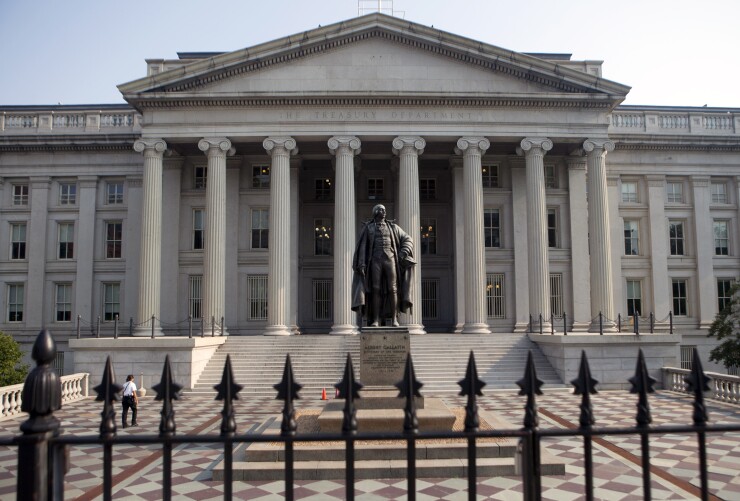WASHINGTON — The Treasury Department in a new report on financial technology urged bank regulators to finalize guidance relating to how banks manage their third party risk with fintechs.
The nonbank financial firms could increase competition in the sector, if they're overseen correctly, the report said, but the lack of regulations compared to insured depository institutions "raises various public policy considerations."
"Where new entrant nonbank firms are re-bundling core banking services outside the bank regulatory perimeter, there may be risks similar to those posed, for example, by the intermingling of commerce and banking," the Treasury Department said in the report, which is part of

The subject of bank-fintech partnerships has taken the attention of regulators recently, notably at the Office of the Comptroller of the Currency. The acting OCC chair, Michael Hsu, has said that he's
Among a slate of recommendations, Treasury suggests that banking regulators finalize guidance on the risk management of third-party relationships. Under the guidance, banks are "ultimately accountable for managing the risks of its own third-party business arrangements."
In cases where federal banking regulators don't have the purview to oversee bank-fintech relationships — such as when the fintech, rather than a bank, is providing a service to the consumer — the Treasury Department said that the Consumer Financial Protection Bureau might need to step in.
"In these instances, the fintech firm's activities may continue to be subject to federal and state consumer protection laws, but the supervision of those activities may not fall within the jurisdiction of the federal banking regulators," according to the report. "To help reduce regulatory gaps and maintain a level playing field, the CFPB and other federal agencies (HUD and FTC) may also need to act with respect to the activities of fintech firms and other non-banks that provide services critical to these business arrangements."
Treasury also recommends that the CFPB "review its authorities" to consider how the agency might oversee larger nonbank consumer lenders, such as buy now/pay later companies.
Outside of the report's official recommendations, Treasury also touches on updates to the Durbin amendment, which caps debit card interchange fees for issuers with more than $10 billion of assets.

"Debit card issuers below that threshold are not limited in the interchange fees that they may charge merchants, providing them with a greater ability to obtain income from such fees as part of their business model," the report says. "This regulatory difference has been key to many non-bank fintech firms' business models and strategies."
Those nonbank fintech firms will enter into relationships with insured depository institutions below the $10 billion total asset threshold to not be limited in the interchange fees, according to the report.
That use of the Durbin amendment's exception for smaller debit card issuers "warrants further examination," the report says, although the report acknowledges the exception's utility in helping community banks.





